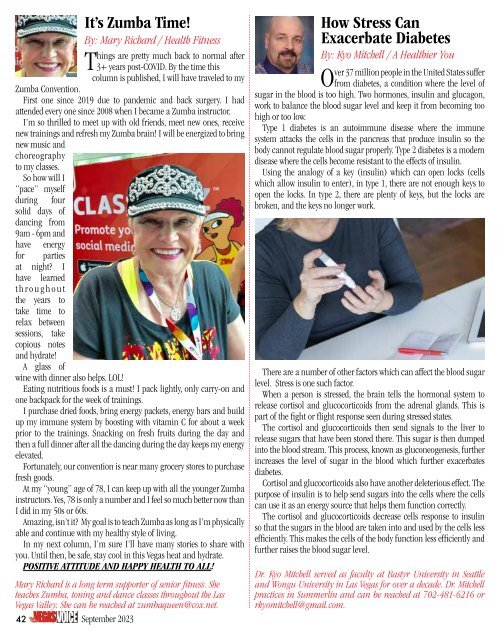Create successful ePaper yourself
Turn your PDF publications into a flip-book with our unique Google optimized e-Paper software.
It’s Zumba Time!<br />
By: Mary Richard / Health Fitness<br />
Things are pretty much back to normal after<br />
3+ years post-COVID. By the time this<br />
column is published, I will have traveled to my<br />
Zumba Convention.<br />
First one since 2019 due to pandemic and back surgery. I had<br />
attended every one since 2008 when I became a Zumba instructor.<br />
I’m so thrilled to meet up with old friends, meet new ones, receive<br />
new trainings and refresh my Zumba brain! I will be energized to bring<br />
new music and<br />
choreography<br />
to my classes.<br />
So how will I<br />
“pace” myself<br />
during four<br />
solid days of<br />
dancing from<br />
9am - 6pm and<br />
have energy<br />
for parties<br />
at night? I<br />
have learned<br />
throughout<br />
the years to<br />
take time to<br />
relax between<br />
sessions, take<br />
copious notes<br />
and hydrate!<br />
A glass of<br />
wine with dinner also helps. LOL!<br />
Eating nutritious foods is a must! I pack lightly, only carry-on and<br />
one backpack for the week of trainings.<br />
I purchase dried foods, bring energy packets, energy bars and build<br />
up my immune system by boosting with vitamin C for about a week<br />
prior to the trainings. Snacking on fresh fruits during the day and<br />
then a full dinner after all the dancing during the day keeps my energy<br />
elevated.<br />
Fortunately, our convention is near many grocery stores to purchase<br />
fresh goods.<br />
At my “young” age of 78, I can keep up with all the younger Zumba<br />
instructors. Yes, 78 is only a number and I feel so much better now than<br />
I did in my 50s or 60s.<br />
Amazing, isn’t it? My goal is to teach Zumba as long as I’m physically<br />
able and continue with my healthy style of living.<br />
In my next column, I’m sure I’ll have many stories to share with<br />
you. Until then, be safe, stay cool in this Vegas heat and hydrate.<br />
POSITIVE ATTITUDE AND HAPPY HEALTH TO ALL!<br />
Mary Richard is a long term supporter of senior fitness. She<br />
teaches Zumba, toning and dance classes throughout the Las<br />
Vegas Valley. She can be reached at zumbaqueen@cox.net.<br />
42<br />
September 20<strong>23</strong><br />
How Stress Can<br />
Exacerbate Diabetes<br />
By: Kyo Mitchell / A Healthier You<br />
Over 37 million people in the United States suffer<br />
from diabetes, a condition where the level of<br />
sugar in the blood is too high. Two hormones, insulin and glucagon,<br />
work to balance the blood sugar level and keep it from becoming too<br />
high or too low.<br />
Type 1 diabetes is an autoimmune disease where the immune<br />
system attacks the cells in the pancreas that produce insulin so the<br />
body cannot regulate blood sugar properly. Type 2 diabetes is a modern<br />
disease where the cells become resistant to the effects of insulin.<br />
Using the analogy of a key (insulin) which can open locks (cells<br />
which allow insulin to enter), in type 1, there are not enough keys to<br />
open the locks. In type 2, there are plenty of keys, but the locks are<br />
broken, and the keys no longer work.<br />
There are a number of other factors which can affect the blood sugar<br />
level. Stress is one such factor.<br />
When a person is stressed, the brain tells the hormonal system to<br />
release cortisol and glucocorticoids from the adrenal glands. This is<br />
part of the fight or flight response seen during stressed states.<br />
The cortisol and glucocorticoids then send signals to the liver to<br />
release sugars that have been stored there. This sugar is then dumped<br />
into the blood stream. This process, known as gluconeogenesis, further<br />
increases the level of sugar in the blood which further exacerbates<br />
diabetes.<br />
Cortisol and glucocorticoids also have another deleterious effect. The<br />
purpose of insulin is to help send sugars into the cells where the cells<br />
can use it as an energy source that helps them function correctly.<br />
The cortisol and glucocorticoids decrease cells response to insulin<br />
so that the sugars in the blood are taken into and used by the cells less<br />
efficiently. This makes the cells of the body function less efficiently and<br />
further raises the blood sugar level.<br />
Dr. Kyo Mitchell served as faculty at Bastyr University in Seattle<br />
and Wongu University in Las Vegas for over a decade. Dr. Mitchell<br />
practices in Summerlin and can be reached at 702-481-6216 or<br />
rkyomitchell@gmail.com.
















